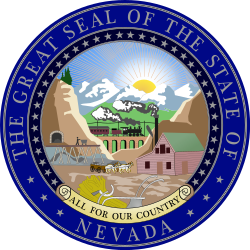| |||||||||||||||||
| |||||||||||||||||
 County results Bible: 50–60% 60–70% Fike: 50–60% | |||||||||||||||||
| |||||||||||||||||
| Elections in Nevada |
|---|
 |
The 1968 United States Senate election in Nevada was held on November 5, 1968. Incumbent Democratic U.S. Senator Alan Bible was re-elected to a third term in office over Republican Edward Fike despite Republican nominee Richard Nixon carrying the state in the concurrent presidential election in the state.

